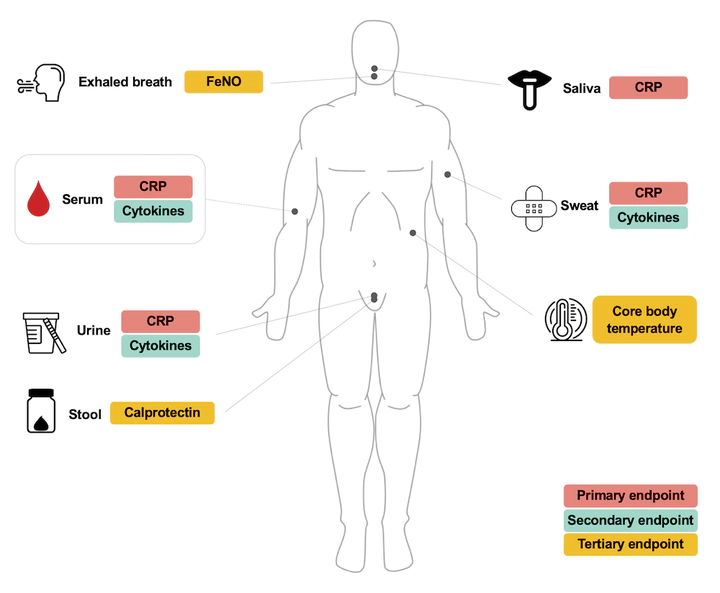Noninvasive, Multimodal Inflammatory Biomarker Discovery for Systemic Inflammation (NOVA Study): Protocol for a Cross-Sectional Study
 Image credit: Jinjoo Shim
Image credit: Jinjoo ShimAbstract
Prolonged systemic inflammation is recognized as a major contributor to the development of various chronic inflammatory diseases. Daily measurements of inflammatory biomarkers can significantly improve disease monitoring of systemic inflammation, thus contributing to reducing the burden on patients and the health care system. There exists, however, no scalable, cost-efficient, and noninvasive biomarker for remote assessment of systemic inflammation. To this end, we propose a novel, multimodal, and noninvasive approach for measuring inflammatory biomarkers. This study aimed to evaluate the relationship between the levels of inflammatory biomarkers in serum (gold standard) and those measured noninvasively in urine, sweat, saliva, exhaled breath, stool, and core body temperature in patients with systemic inflammation. This study is a single-center, cross-sectional study and includes a total of 20 participants (10 patients with systemic inflammation and 10 control patients). Eligible participants provide serum, urine, sweat, saliva, exhaled breath, and stool samples for biomarker analyses. Core body temperature is measured using a sensor. The primary end point is the level of C-reactive protein (CRP). The secondary end points are interleukin (IL)–1β, IL-6, IL-8, IL-10, and tumor necrosis factor-α levels. The tertiary end points are fractional exhaled nitric oxide, calprotectin, and core body temperature. Samples will be collected in 2 batches, enabling preliminary analysis of the first batch (patients 1-5 from each group). The full analysis will include both batches. CRP and cytokine levels will be measured using enzyme-linked immunosorbent assay and electrochemiluminescence immunoassay. For statistical analysis, the Shapiro-Wilk test will be used to evaluate the normality of the distribution in each variable. We will perform the 2-tailed t test or Wilcoxon rank sum test to compare the levels of inflammatory biomarkers between patients with systemic inflammations and control patients. Pearson and Spearman correlation coefficients will assess the relationship between inflammatory biomarkers from noninvasive methods and serum biomarkers. Using all-subset regression analysis, we will determine the combination of noninvasive methods yielding the highest predictive accuracy for serum CRP levels. Participants’ preferences for sampling methods will be assessed through a questionnaire. The study received ethics approval from the independent research ethics committee of Canton Zurich on October 28, 2022. A total of 20 participants participated in the study measurements. Data collection started on February 22, 2023, and was completed on September 22, 2023. Participants were on average 52.8 (SD 14.4; range 24-82) years of age, and 70% (14/20) of them were women. The analysis results reporting findings are expected to be published in 2025. This study aims to evaluate the feasibility of noninvasive, multimodal assessment of inflammatory biomarkers in patients with systemic inflammation. Promising results could lead to the creation of noninvasive and potentially digital biomarkers for systemic inflammation, enabling continuous monitoring and early diagnosis of inflammatory activity in a remote setting.